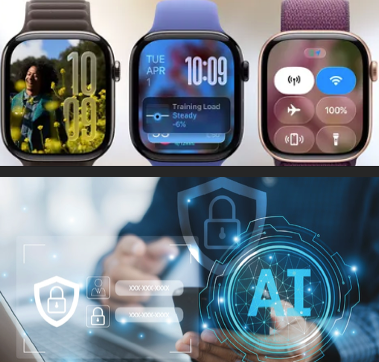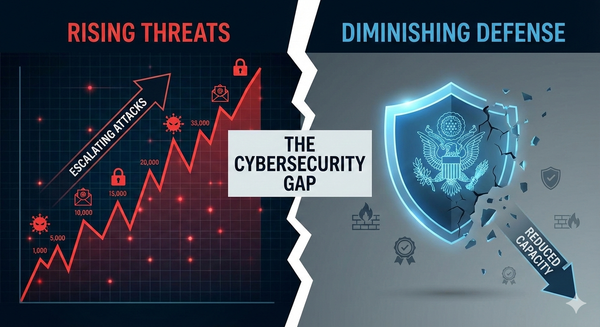"Latest Technology News September 2025: Apple Watch Updates, Cybersecurity Threats & AI Market Trends"

Your friendly guide to the most exciting technology and cybersecurity developments this week. Reading time: Approximately 8-10 minutes
Hey tech enthusiasts! I'm back with another exciting roundup of the biggest technology and cybersecurity stories that caught my attention this week. From groundbreaking Apple releases to pretty alarming cybersecurity developments, September 24-26, 2025, has been packed with news reshaping our digital landscape. Grab your favorite beverage and let's dive into what's been happening!
🍎 Apple's "Awe Dropping" Week: The Ultra 3 and Series 11 Are Finally Here!
I have to start with the biggest consumer tech story of the week—Apple's long-awaited Apple Watch release! After months of speculation and leaks, we finally got our hands on the official details, and honestly, I'm pretty impressed with what Apple has pulled off.
Apple Watch Ultra 3: Satellite Connectivity Changes Everything
The Apple Watch Ultra 3 just launched, and this might be the most significant Apple Watch upgrade we've seen in years. What headline feature has me most excited about? Satellite connectivity. Yes, you read that right – your watch can now send messages via satellite when you're completely off the grid. Apple Watch Ultra 3 brings satellite communications like built-in Emergency SOS via satellite, Messages via satellite, and location sharing via satellite.
I've been testing outdoor gear for a few years, and this is genuinely game-changing for hikers, mountaineers, and anyone who ventures into remote areas. Can I now send an emergency message or share my location even when there's no cell tower for miles? That's the kind of innovation that saves lives.
What else is new:
- Larger display: Evidence from a recent iOS 26 beta points to a slightly larger display for the upcoming Apple Watch Ultra 3. MacRumors uncovered an image with a resolution of 422 x 514 pixels – higher than the current Ultra 2's 410 x 502 panel
- 42-hour battery life: Perfect for multi-day adventures
- 5G connectivity: Finally! The cellular connection gets a much-needed upgrade
- Blood pressure monitoring: Apple Watch Series 11 and Apple Watch Ultra 3 will offer blood pressure monitoring and hypertension detection
Apple Watch Series 11: Health Gets Smarter
The Series 11 might not have satellite connectivity, but it has health features that will help people. The hypertension detection feature particularly caught my attention – with heart disease being such a significant health concern, having early warning signs on your wrist could be incredibly valuable.
The pricing remains the same as previous generations, with Apple Watch Series 11 starting at $399, Ultra 3 starting at $799, and SE (3rd-gen) starting at $249. Given the features you're getting, especially the blood pressure monitoring, that's a pretty reasonable value.
🚨 Major Cybersecurity Alert: China-Linked Groups Target US Tech Supply Chains
Now, let's shift gears to some concerning cybersecurity news that broke this week. Google's Threat Intelligence Group released some pretty alarming findings about sophisticated Chinese-backed hackers, and this one worries me.
The BrickStorm Campaign: Next-Level Espionage
Highly sophisticated hackers linked to the Chinese government are breaking into technology companies, software-as-a-service providers, and legal-services firms with stealthy malware, allowing them to steal sensitive data quietly from those companies and their customers.
What makes this particularly concerning is how patient and sophisticated these attackers are. They're not just going after direct targets—they're compromising software suppliers and then using that access to reach the suppliers' customers. This supply chain attack methodology reminds me of the SolarWinds incident, but it could be even more widespread.
The scary details:
- 393-day average detection time: Google said it has taken victims an average of 393 days to discover the intrusions, a remarkably long "dwell time"
- Evading detection: The malware called "BrickStorm" targets systems that can't run endpoint detection software
- Stolen source code: The threat actors have also stolen the source code for widely used enterprise technologies, likely as part of an effort to analyze them for undisclosed vulnerabilities
What This Means for Businesses
I've been in the cybersecurity space long enough to know that the situation is serious when Google publicly announces an ongoing campaign like this. "This is happening in the United States, this is next-level activity, and we're only going to learn more about it over time," said John Hultquist, chief analyst at Google's Threat Intelligence Group.
If you're running a business, especially in tech or legal services, here's what I recommend:
- Audit your suppliers: Know who has access to your systems
- Implement zero-trust architecture: Don't trust, always verify
- Monitor for unusual network activity: 393 days is too long to remain undetected
- Use Google's detection tools: They've released tools to scan for BrickStorm indicators
💰 The AI Investment Bubble: Oracle's Reality Check
One of the more interesting business stories this week was Oracle's stock taking a beating, dropping 5% and continuing a three-day losing streak. After some recent deals, the market action appears to reflect concerns about record-high valuations and potentially risky circular relationships in the AI industry.
This caught my attention because we're seeing some market skepticism about AI valuations. Don't get me wrong—AI is transformative technology, but when companies like Nvidia invest in OpenAI, which then spends that money on Nvidia chips, you have to wonder about the sustainability of these circular relationships.
The Nvidia-OpenAI Deal
Speaking of which, Nvidia's OpenAI investment will be in cash, primarily used for Nvidia chips. This arrangement is becoming increasingly common in the AI space, and while it makes business sense for Nvidia, it raises questions about how we're valuing these AI companies.
🌐 Global Tech Roundup: Instagram Hits 3 Billion Users
Let's end on a more positive note! Instagram now has 3 billion monthly active users. That's genuinely mind-blowing when you think about it – nearly 40% of the world's population is using Instagram monthly. It really shows how central social media has become to global communication.
Other Notable Developments:
Xiaomi's Bold Move: Xiaomi is directly challenging Samsung with new smartphones and appliances. Competition is always good for consumers, and Xiaomi has consistently delivered great value in the tech space.
Micron's AI Boom: Micron beats on earnings as company sales rise 46% on AI boom. The semiconductor industry continues to benefit from AI demand, though we should watch for any signs of overheating in this market.
🔮 Looking Ahead: What These Trends Mean
As I reflect on this week's news, a few themes stand out:
- Connectivity is becoming universal: With satellite connectivity in watches and 5G expansion, we're moving toward a world where "disconnected" becomes increasingly rare.
- Cybersecurity threats are getting more sophisticated: The BrickStorm campaign shows that nation-state actors are playing a longer, more patient game. Traditional security measures aren't enough anymore.
- AI valuations need a reality check: While AI is revolutionary, some circular investment patterns suggest we might be in bubble territory.
- Health tech is mainstreaming. Blood pressure monitoring in consumer watches shows how health technology is moving from medical devices to everyday gadgets.
Final Thoughts
This week has been a perfect example of how quickly our technology landscape evolves. From Apple pushing the boundaries of what a watch can do, to sophisticated adversaries demonstrating new levels of patience and skill, to market forces starting to question some of our AI assumptions – there's a lot to process.
What excites me most is how these developments push us toward a more connected, health-conscious, and security-aware world. Yes, the cybersecurity threats are concerning, but they also force us to build better, more resilient systems.
The key is staying informed and adaptable. Technology will continue to evolve rapidly, and our ability to thoughtfully integrate these changes while managing the risks will determine how much we benefit from the innovation.
Stay Updated: Follow me for more weekly tech roundups, and let me know in the comments what stories you found most interesting this week!
Sources: TechCrunch, SecurityWeek, The Hacker News, Cybersecurity Dive, Apple Newsroom, CNBC, TechRadar



